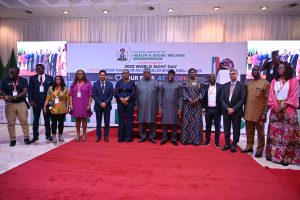Join a powerful, unprecedented alliance for better eye health for all.
Join IAPB-
Choose an alternate language here
 On World Sight Day 2023, the Nigerian government through the Federal Ministry of Health and Social Welfare launched several important and strategic documents for eye health in Nigeria at a colourful event attended by the representatives of the President Bola Tinubu and First Lady Oluremi Tinubu, senior government officials, development partners, representatives of pharmaceutical, patient support groups and medical professionals in diabetic and eye care.
On World Sight Day 2023, the Nigerian government through the Federal Ministry of Health and Social Welfare launched several important and strategic documents for eye health in Nigeria at a colourful event attended by the representatives of the President Bola Tinubu and First Lady Oluremi Tinubu, senior government officials, development partners, representatives of pharmaceutical, patient support groups and medical professionals in diabetic and eye care.
For a country of around 223 million people, with a rapidly growing population, a comprehensive eye care strategy and guidelines are vital to deal with blindness and vision impairment nationally.
In 2020 in Nigeria, there were an estimated 24 million people living with vision loss and 1.3 million people were blind. A further 50 million people have non-vision impairing eye conditions needing basic eye care services.
The National Eye Health Programme launched the following three documents for the country:
1) The National Eye Health Strategic Development Plan (2024-2028)
This strategy focuses on ‘universal eye care services towards universal health coverage’ for Nigeria. The strategy is to implement inclusive, integrated, patient-centred eye services that meet the needs and aspirations of Nigerians, striking the balance between promotive, preventive, curative and rehabilitative services.
The strategy sets 7 strategic objectives for eye care in Nigeria, looking at equitable access, quality and financing.
2) The Diabetic Retinopathy (DR) Screening and Management Guidelines
Nearly 4% of Nigerians are estimated to have Diabetes Mellitus, and over 20% of them have diabetic retinopathy.
The new DR guidelines, the first for Nigeria, aim to reduce the burden of DR-related visual impairment by providing a comprehensive framework for screening, diagnosis, and management of the disease. The document covers the epidemiology of diabetes and DR, clinical guidelines for the disease and the implementation of the screening and treatment programme in Nigeria.
3) The Nigeria Glaucoma Guidelines and Toolkit
In Africa, glaucoma is a serious and irreversibly blinding eye condition of public health importance, with a prevalence of about 4% in people aged 40 years and above. People with glaucoma often present at the hospital with advanced disease, with about 90% already blind in one eye.
These guidelines and toolkit are intended to help develop protocols and models of care for glaucoma services in Nigeria. It contains practical steps towards the diagnosis of glaucoma, risk assessment for progression and management decisions, specific guidance for treatment and referral to key resources.
This great progress for eye health in Nigeria is thanks to the hard work of the National Eye Health Programme team in Nigeria, supported by many collaborators including Sightsavers, Novartis, Eye Foundation Hospital Group, State Eye Health desk officers, the University of Abuja, Professionals in Eye Health, the DR-NET and Glaucoma-NET at the International Centre for Eye Health, and the Endocrine and Metabolic Society of Nigeria.
Access the guidelines here: https://health.gov.ng/index.php?option=com_content&view=article&id=156&Itemid=527 alth.gov.ng